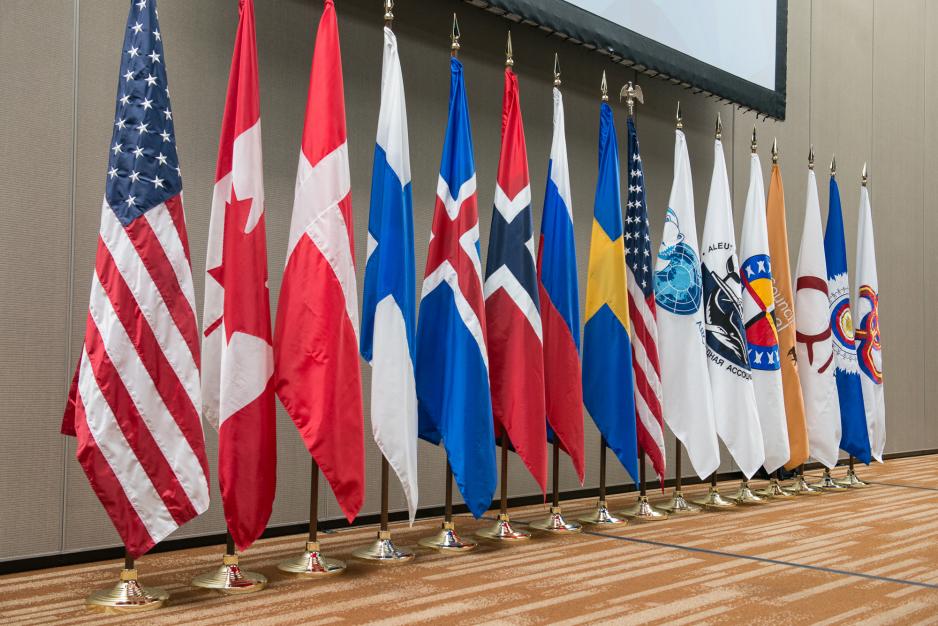Op-Ed: The Arctic Council at 20: A Work in Progress

The Arctic Council is nominated for The Nobel Peace Prize. (Photo: Arctic Council Secretariat/Linnea Nordström).
When the Arctic Council was established in 1996, interest in the high North was limited. Today, the geopolitical situation is different, melting ice in the Arctic Ocean is a key signal of climate change, and interest in economic activities in the Arctic is growing. In short: the Arctic is on the global political agenda, giving the Arctic Council an importance not foreseen at its establishment two decades ago.
When the Arctic Council was established in 1996, interest in the high North was limited. Today, the geopolitical situation is different, melting ice in the Arctic Ocean is a key signal of climate change, and interest in economic activities in the Arctic is growing. In short: the Arctic is on the global political agenda, giving the Arctic Council an importance not foreseen at its establishment two decades ago.
The Arctic Council was set up as a "high level forum" for cooperation among the eight Arctic states: Canada, Denmark, Finland, Iceland, Norway, Russia, Sweden and the USA, in particular in the areas of sustainable development and environmental protection. Six groups of indigenous peoples are permanent participants in the cooperation. A number of other countries, as well as intergovernmental organizations and representatives of civil society are observers. A secretariat is located in Tromsø. The chairmanship rotates among the member states following ministerial meetings every second year. The actual work of the Council takes place in six permanent working groups and ad hoc task forces.
After two decades of operation, the most important legacy of the Arctic Council is that our knowledge about the Arctic is enormously improved upon. A number of comprehensive assessments has been carried out, on climate change and its effects, pollution, biological diversity, shipping, and petroleum activity, among others. This has brought a substantial body of new knowledge about the Arctic environment as well as the potential for economic activity. A prime example is the Arctic Climate Impact Assessment which contributed significantly to the global understanding of the effects of climate change.
Also, the Arctic Council has adopted a number of normative documents, providing frameworks for the development of future international cooperation. One example in this regard is the Arctic Marine Strategic Plan, a first version of which was adopted in 2004 and a second in 2015, addressing the period up to 2025.
Building on such initiatives, several international legally binding agreements have been negotiated under the auspices of the Arctic Council. An agreement on search and rescue (2011) was motivated by the prospects of increased aeronautical and maritime activities in the Arctic, strengthening international coordination in search and rescue operations. A second agreement, on marine oil pollution preparedness and response (2013) was negotiated in anticipation of a need for strengthened international cooperation on oil spill prevention.
In addition to boosting our knowledge and the level of cooperation, an important long-term effect of the cooperation in the Arctic Council is an enhanced understanding of other actors and their concerns. In Arctic science as well as in public administration, international cooperative networks have evolved around themes as climate change, biological diversity, and pollution.
Still another important development is that our understanding of what is “arctic” is evolving. The Arctic used to be associated with vast, white, remote, cold and largely unpopulated places. Today, a more comprehensive understanding reigns, where the term “arctic” is considered to encompass among others Iceland and the Faroe islands, both well below the Arctic Circle. In North America, the “Arctic” is perceived to extend even further south.
The Arctic Council is a work in progress. The current chair, USA, has emphasized organizational development and long term strategic thinking. These are important foundations for the future development of the Arctic Council when facing the evolving significance of the Arctic, geopolitically, climate-wise, and in terms of economic activities. These aspects makes the Arctic Council an attractive arena to many actors outside the Arctic. Currently there are some 30 observers, and another 15+ actors have applied for observer status. Finland will assume the chairmanship at the next ministerial meeting of the Arctic Council, in Fairbanks in May 2017.
The Arctic sits on the territories of the eight Arctic states and the oceans under their respective jurisdictions. A large number of international treaties applies to a number of issue areas such as environmental protection, shipping, fisheries, etc. The 1982 Law of the Sea Convention, “the Constitution of the oceans”, sets the global ground rules for the management and use of the oceans, providing among other things for coastal state jurisdiction over natural resources in the continental shelves and out to 200 nautical miles in the sea. The Arctic Council is based on a non-binding declaration among the eight Arctic states, as a forum for cooperation. Its core business has been the building of knowledge and development of common approaches to common problems as they evolve.
In anticipation of a future need for strengthened international cooperation on marine issues, the US chairmanship has initiated an assessment on the need for and format of future marine cooperation in the Arctic Ocean. Also, over the last three years a third legally binding agreement, on science cooperation, has been negotiated under the auspices of the Arctic Council. This agreement aims to reduce practical obstacles to cooperation and will be tabled at the upcoming ministerial meeting.
These examples demonstrate that the Arctic Council during the two decades of its existence has been able to address emerging challenges in a number of issue areas, as well as arriving at cooperative solutions to them among the eight member states. The geopolitical significance of the Arctic will continue to grow. Problem-solving capacity and will to cooperate will be critical also in the future.
The Arctic Council was set up as a "high level forum" for cooperation among the eight Arctic states: Canada, Denmark, Finland, Iceland, Norway, Russia, Sweden and the USA, in particular in the areas of sustainable development and environmental protection. Six groups of indigenous peoples are permanent participants in the cooperation. A number of other countries, as well as intergovernmental organizations and representatives of civil society are observers. A secretariat is located in Tromsø. The chairmanship rotates among the member states following ministerial meetings every second year. The actual work of the Council takes place in six permanent working groups and ad hoc task forces.
After two decades of operation, the most important legacy of the Arctic Council is that our knowledge about the Arctic is enormously improved upon. A number of comprehensive assessments has been carried out, on climate change and its effects, pollution, biological diversity, shipping, and petroleum activity, among others. This has brought a substantial body of new knowledge about the Arctic environment as well as the potential for economic activity. A prime example is the Arctic Climate Impact Assessment which contributed significantly to the global understanding of the effects of climate change.
Also, the Arctic Council has adopted a number of normative documents, providing frameworks for the development of future international cooperation. One example in this regard is the Arctic Marine Strategic Plan, a first version of which was adopted in 2004 and a second in 2015, addressing the period up to 2025.
Building on such initiatives, several international legally binding agreements have been negotiated under the auspices of the Arctic Council. An agreement on search and rescue (2011) was motivated by the prospects of increased aeronautical and maritime activities in the Arctic, strengthening international coordination in search and rescue operations. A second agreement, on marine oil pollution preparedness and response (2013) was negotiated in anticipation of a need for strengthened international cooperation on oil spill prevention.
In addition to boosting our knowledge and the level of cooperation, an important long-term effect of the cooperation in the Arctic Council is an enhanced understanding of other actors and their concerns. In Arctic science as well as in public administration, international cooperative networks have evolved around themes as climate change, biological diversity, and pollution.
Still another important development is that our understanding of what is “arctic” is evolving. The Arctic used to be associated with vast, white, remote, cold and largely unpopulated places. Today, a more comprehensive understanding reigns, where the term “arctic” is considered to encompass among others Iceland and the Faroe islands, both well below the Arctic Circle. In North America, the “Arctic” is perceived to extend even further south.
The Arctic Council is a work in progress. The current chair, USA, has emphasized organizational development and long term strategic thinking. These are important foundations for the future development of the Arctic Council when facing the evolving significance of the Arctic, geopolitically, climate-wise, and in terms of economic activities. These aspects makes the Arctic Council an attractive arena to many actors outside the Arctic. Currently there are some 30 observers, and another 15+ actors have applied for observer status. Finland will assume the chairmanship at the next ministerial meeting of the Arctic Council, in Fairbanks in May 2017.
The Arctic sits on the territories of the eight Arctic states and the oceans under their respective jurisdictions. A large number of international treaties applies to a number of issue areas such as environmental protection, shipping, fisheries, etc. The 1982 Law of the Sea Convention, “the Constitution of the oceans”, sets the global ground rules for the management and use of the oceans, providing among other things for coastal state jurisdiction over natural resources in the continental shelves and out to 200 nautical miles in the sea. The Arctic Council is based on a non-binding declaration among the eight Arctic states, as a forum for cooperation. Its core business has been the building of knowledge and development of common approaches to common problems as they evolve.
In anticipation of a future need for strengthened international cooperation on marine issues, the US chairmanship has initiated an assessment on the need for and format of future marine cooperation in the Arctic Ocean. Also, over the last three years a third legally binding agreement, on science cooperation, has been negotiated under the auspices of the Arctic Council. This agreement aims to reduce practical obstacles to cooperation and will be tabled at the upcoming ministerial meeting.
These examples demonstrate that the Arctic Council during the two decades of its existence has been able to address emerging challenges in a number of issue areas, as well as arriving at cooperative solutions to them among the eight member states. The geopolitical significance of the Arctic will continue to grow. Problem-solving capacity and will to cooperate will be critical also in the future.

